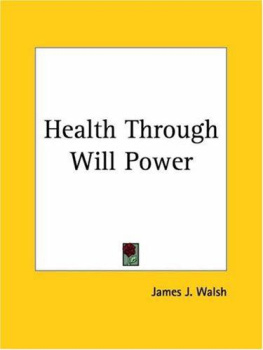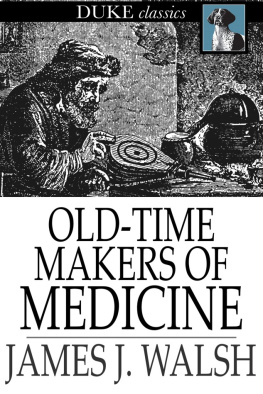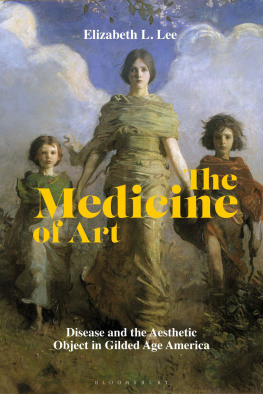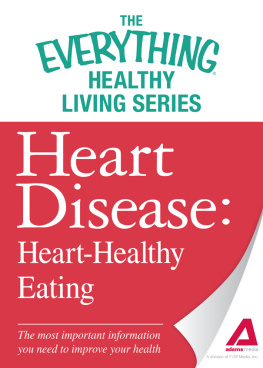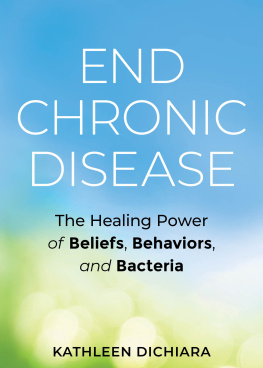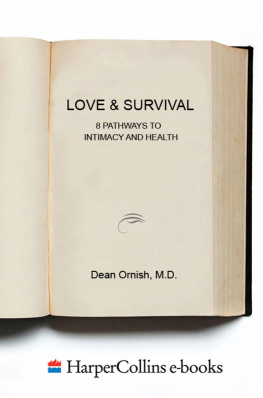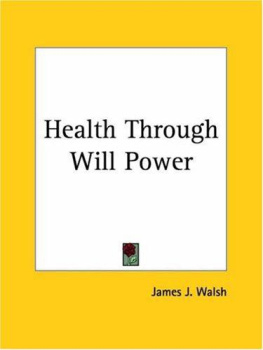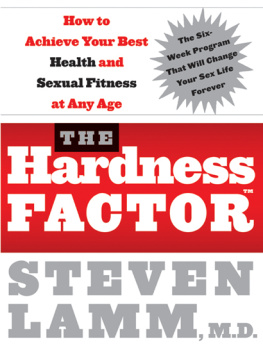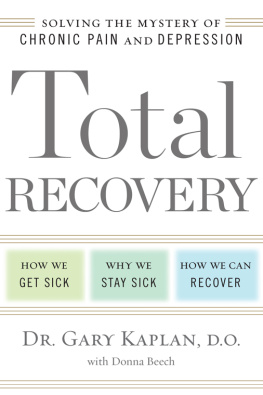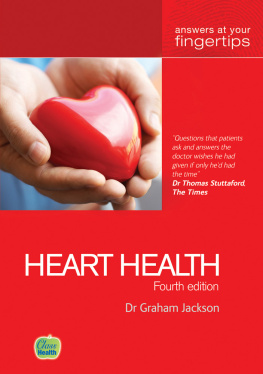The Project Gutenberg EBook of Health Through Will Power, by James J. Walsh
This eBook is for the use of anyone anywhere at no cost and with
almost no restrictions whatsoever. You may copy it, give it away or
re-use it under the terms of the Project Gutenberg License included
with this eBook or online at www.gutenberg.net
Title: Health Through Will Power
Author: James J. Walsh
Release Date: August 17, 2011 [EBook #37109]
Language: English
*** START OF THIS PROJECT GUTENBERG EBOOK HEALTH THROUGH WILL POWER ***
Produced by Don Kostuch
[Transcriber's Notes]
Page numbers in this book are indicated by numbers enclosed in curly braces, e.g. {99}. They have been located where page breaks occurred in the original book.
This book is derived from a copy on the Internet Archive:
http://www.archive.org/details/cu31924012175505
Obvious spelling or typographical errors have been corrected. Inconsistent spelling of names and inventive and alternative spelling is left as printed.
Extended quotations and citations are indented such as reports, letters and interviews.
[End Transcriber's Notes]
HEALTH THROUGH WILL POWER
BY
JAMES J. WALSH, M.D., Ph.D., Sc.D., Etc.
MEDICAL DIRECTOR OF FORDHAM UNIVERSITY SCHOOL OF SOCIOLOGY; PROFESSOR OF PHYSIOLOGICAL PSYCHOLOGY AT CATHEDRAL COLLEGE; LECTURER ON PSYCHOLOGY, MARYWOOD COLLEGE, ETC.
BOSTON
LITTLE, BROWN, AND COMPANY
1919
Copyright, 1919,
By Little, Brown, and Company.
All rights reserve
Published, November, 1919
Norwood Press
Set up and electrotyped by J. S. Cushing Co.,
Norwood, Mass., U.S.A.
To
J. H. W.
EX ANIMO ET CORDE
J. J. W.
{vii}
PREFACE
A French surgeon to whom the remark was made in the third year of the War that France was losing an immense number of men replied: "Yes, we are losing enormously, but for every man that we lose we are making two men." What he meant, of course, was that the War was bringing out the latent powers of men to such an extent that every one of those who were left now counted for two. The expression is much more than a mere figure of speech. It is quite literally true that a man who has had the profound experience of a war like this becomes capable of doing ever so much more than he could before. He has discovered his own power. He has tapped layers of energy that he did not know he possessed. Above all, he has learned that his will is capable of enabling him to do things that he would have hesitated about and probably thought quite impossible before this revelation of himself to himself had been made.
{viii}
In a word, the War has proved a revival of appreciation of the place of the human will in life. Marshal Foch, the greatest character of the War, did not hesitate even to declare that "A battle is the struggle of two wills. It is never lost until defeat is accepted. They only are vanquished who confess themselves to be."
Our generation has been intent on the development of the intellect. We have been neglecting the will. "Shell shock" experiences have shown us that the intellect is largely the source of unfavorable suggestion. The will is the controlling factor in the disease. Many another demonstration of the power of will has been furnished by the War. This volume is meant to help in the restoration of the will to its place as the supreme faculty in life, above all the one on whose exercise, more than any other single factor, depends health and recovery from disease. The time seems opportune for its appearance and it is commended to the attention of those who have recognized how much the modern cult of intellect left man unprepared for the ruder trails of life yet could not see clearly what the remedy might be.
{ix}
CONTENTS
|
| PAGE |
| Preface | vii |
| CHAPTER |
| I | The Will in Life |
| II | Dreads |
| III | Habits |
| IV | Sympathy |
| V | Self-Pity |
| VI | Avoidance of Conscious Use of the Will |
| VII | What the Will Can Do |
| VIII | Pain and the Will |
| IX | The Will and Air and Exercise |
| X | The Will to Eat |
| XI | The Place of the Will in Tuberculosis |
| XII | The Will in Pneumonia |
| XIII | Coughs and Colds |
| XIV | Neurotic Asthma and the Will |
| XV | The Will in Intestinal Function |
| XVI | The Will and the Heart |
| XVII | The Will in So-Called Chronic Rheumatism |
| XVII | Psycho-Neuroses |
| XIX | Feminine Ills and the Will |
| Index |
{1}
HEALTH THROUGH WILL POWER
CHAPTER I
THE WILL IN LIFE
"What he will he does and does so much
That proof is called impossibility." |
| Troilus and Cressida. |
The place of the will in its influence upon health and vitality has long been recognized, not only by psychologists and those who pay special attention to problems of mental healing, but also, as a rule, by physicians and even by the general public. It is, for instance, a well-established practice, when two older folk, near relatives, are ill at the same time, or even when two younger persons are injured together and one of them dies, or perhaps has a serious turn for the worse, carefully to keep all knowledge of it from the other one. The reason is a very definite conviction that in the revulsion of feeling caused by learning of the fatality, or as {2} a result of the solicitude consequent upon hearing that there has been a turn for the worse, the other patient's chances for recovery would probably be seriously impaired. The will to get better, even to live on, is weakened, with grave consequences. This is no mere popular impression due to an exaggeration of sympathetic feeling for the patient. It has been noted over and over again, so often that it evidently represents some rule of life, that whenever by inadvertence the serious condition or death of the other was made known, there was an immediate unfavorable development in the case which sometimes ended fatally, though all had been going well up to that time. This was due not merely to the shock, but largely to the "giving up", as it is called, which left the surviving patient without that stimulus from the will to get well which means so much.
It is surprising to what an extent the will may affect the body, even under circumstances where it would seem impossible that physical factors could any longer have any serious influence. We often hear it said that certain people are "living on their wills", and when they are of the kind who take comparatively little food and yet succeed in accomplishing {3} a great deal of work, the truth of the expression comes home to us rather strikingly. The expression is usually considered, however, to be scarcely more than a formula of words elaborated in order to explain certain of these exceptional cases that seem to need some special explanation. The possibility of the human will of itself actually prolonging existence beyond the time when, according to all reason founded on physical grounds, life should end, would seem to most people to be quite out of the question. And yet there are a number of striking cases on record in which the only explanation of the continuance of life would seem to be that the will to live has been so strongly aroused that life was prolonged beyond even expert expectation. That the will was the survival factor in the case is clear from the fact that as soon as this active willing process ceased, because the reason that had aroused it no longer existed, the individuals in question proceeded to reach the end of life rapidly from the physical factors already at work and which seemed to portend inevitably an earlier dissolution than that which happened. Probably a great many physicians know of striking examples of patients who have lived beyond the time when ordinarily death would {4} be expected, because they were awaiting the arrival of a friend from a distance who was known to be coming and whom the patient wanted very much to see. Dying mothers have lived on to get a last embrace of a son or daughter, and wives have survived to see their husbands for a last partingthough it seemed impossible that they should do so, so far as their physical condition was concernedand then expired within a short time. Of course there are any number of examples in which this has not been true, but then that is only a proof of the fact that the great majority of mankind do not use their wills, or perhaps, having appealed to them for help during life never or but slightly, are not prepared to make a definite serious call on them toward the end. I am quite sure, however, that a great many country physicians particularly can tell stories of incidents that to them were proofs that the will can resist even the approach of death for some time, though just as soon as the patients give up, death comes to them.

